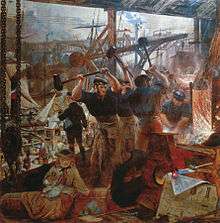Industrial Age

The Industrial Age is a period of history that encompasses the changes in economic and social organization that began around 1760 in Great Britain and later in other countries, characterized chiefly by the replacement of hand tools with power-driven machines such as the power loom and the steam engine, and by the concentration of industry in large establishments.[1][2]
While it's commonly believed that the Industrial Age was supplanted by the Information Age in the late 20th century,[3] a view that's become common since the Revolutions of 1989, as of 2013 electric power generation is still based mostly on fossil fuels and much of the Third World economy is still based on manufacturing. Thus it is debatable whether we have left the Industrial Age already or are still in it and in the process of reaching the Information Age.[4]
Origins
The Industrial mining from places such as Wales and County Durham.
The steam engine allowed for steamboats and the locomotives, which made transportation much faster. By the mid-19th century the Industrial Revolution had spread to Continental Europe and North America, and since then it has spread to most of the world.
Characteristics
The Industrial Age is defined by mass production, broadcasting, the rise of the nation state, power, modern medicine and running water. The quality of human life has increased dramatically during the Industrial Age. Life expectancy today worldwide is more than twice as high as it was when the Industrial Revolution began.
See also
References
- ↑ Two Views Of The British Industrial Revolution, Peter Temin
- ↑ "Industrial-revolution - Define Industrial-revolution at Dictionary.com". Dictionary.com.
- ↑ "5 Myths About the 'Information Age'". The Chronicle of Higher Education.
- ↑ "Human beings have never before lived in a condition where our actions today literally affect people". senscot.net.